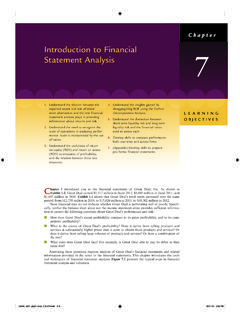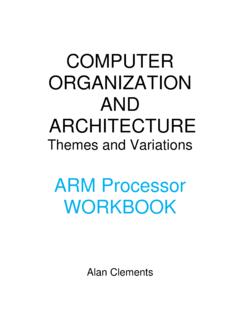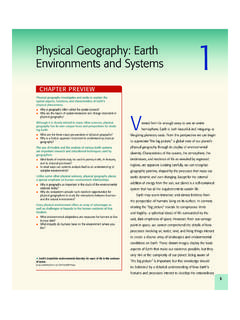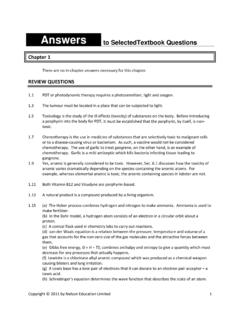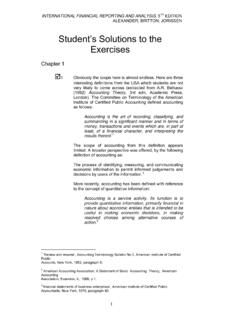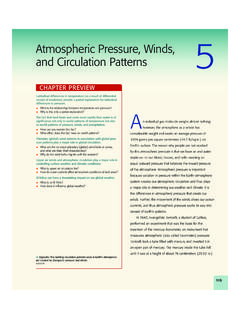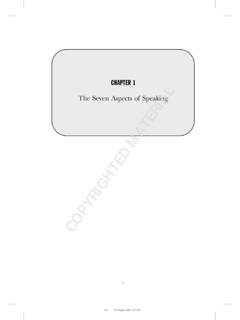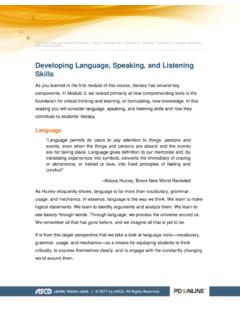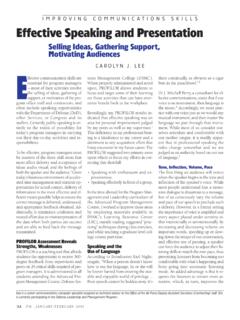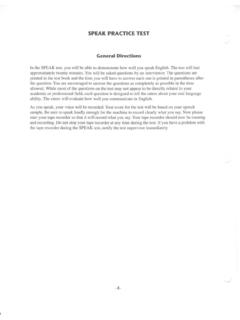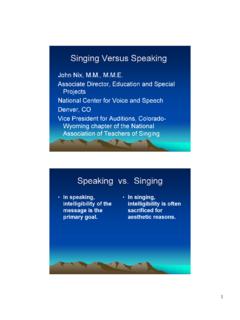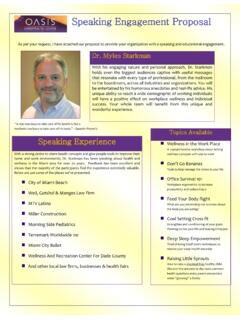Transcription of Special Occasion Speaking - Cengage
1 16 Special Occasion SpeakingtttSpecial Occasion Speaking : An OverviewOrganization of Special Occasion SpeechesPurposes of Special Occasion SpeakingSpeeches of IntroductionPresentations of AwardsAcceptance SpeechesCommemorative SpeechesTributesToastsEulogiesAfter-Dinn er SpeechesSample Speech 8: Learn to Listen with Your Heart, by Martha SaundersSummary Practice SuggestionsYour public- Speaking experience will include informative and persuasive pre-sentations. Often, however, you will be in situations that invite a somewhatdifferent approach to public communication. Significant events in people slives call for public recognition. From birth announcements to eulogies, the rituals oflife involve the ritual of speech making. Consider the following situations and therole a public presentation would play:wYou have just received an award and are asked to say a few words.
2 WYour best friend is getting married. At the reception, you are responsible forproposing a toast to the local civic organization invites you to give a speech at their annual college roommate has just been elected class president. The campaign man-ager asks if you would be willing to introduce your friend, who will then makeher victory favorite uncle has just died. The family asks you to deliver a memorialspeech at the examples represent just a few of the many Special occasions where public speak-ing is Occasion Speaking :An OverviewtttSpecial Occasion speeches or ceremonial speeches differ from informative andpersuasive speeches. Unlike informative presentations, ceremonial addresses donot offer large doses of new knowledge or present detailed instructions.
3 Unlikepersuasive presentations, Special Occasion speeches do not generally deal with contro-versial issues or attempt to change the way audiences think or act. In general, cere-monial presentations avoid controversy and reaffirm the audience s beliefs. outlines the key characteristics of informative, persuasive, and Special of Special Occasion SpeechesSpecial Occasion addresses, like informative and persuasive speeches, are organizedwith an introduction, body, and conclusion. Let s look at the introduction first. Nomatter whether you start your speech with a compelling story, a memorable quote, ora startling fact, you should include something in your introduction that evokes thecommon values or feelings that have brought your audience example,Barbara Jordan, who delivered the keynote address at the 1976 Democratic NationalConvention, began her talk by pointing out how the participants were continuing a144-year-old tradition.
4 Also, as the first African-American woman ever to deliver theaddress, she acknowledged the party s role in making this part of the American DreamSpecial Occasion Speakingcome true for her. After referring to the history of Democratic nominating conven-tions, she said, And our meeting this week is a continuation of that tradition .. buttonight here I am. And I feel that notwithstanding the past my presence here is oneadditional bit of evidence that the American Dream need not forever be deferred. 2 Depending on your audience and the Occasion , you may need to establish yourcredibility in the introduction as well. This is especially important if you are unknownto the audience or if your expertise on the topic is unknown. And, in most Special oc-casion speeches, you should clearly state the purpose of your remarks and previewyour main points.
5 Although in some speeches to commemorate, it may be more ap-propriate to state the purpose only. For example, in a brief toast, tribute, or eulogy,no preview is the body of a Special Occasion speech, you will want to concentrate especiallyon making your main points clear and on supporting them with a variety of enter-taining and even inspiring materials. Review Chapter 7 for a summary of the varioustypes of supporting conclusion of Special Occasion speeches refocuses audience interest not sim-ply on the presentation but on who the listeners are and what they stand for. Thespeech gives audience members an opportunity to strengthen their sense of identityand visual aids can capture audience attention rapidly and effectively, they canbe especially useful in Special Occasion speeches.
6 During his final State of the Unionaddress, Ronald Reagan complained about the unnecessary complexity of congres-sional regulations. Instead of just talking about wasteful paperwork, Reagan placednear the podium the bound volumes of the several-thousand-page-long federal bud-get, which weighed in at more than 20 pounds. That gesture demonstrated moreclearly than any words just how much paperwork Congress was can use visual aids to your advantage during a Special Occasion speech. If youare introducing a well-known writer, you might display a stack of his books to showhow productive his career has been. If you are presenting an award, you could show aFigure Objectives of Informative, Persuasive,and Special OccasionSpeakingTo congratu-late students in a public- Speaking class after their first speechGoalShare knowl-edge: instruct,demonstrateInfluence beliefor action: gaincompliance,alter behaviorEntertain andreinforce:strengthen bonds among audiencemembersSample TopicTo explain theprocess ofpublic speakingTo convincelisteners thatthey shouldtake a coursein publicspeakingInformativePersuasiveSpeci al Occasionchart that lists the criteria for the award and then match the recipient s accomplish-ments to the criteria.
7 Keep alert to the opportunities for incorporating visual aidsinto Special Occasion speeches, especially when you want to offer audience membersa concrete reminder of what they should recall from the of Special Occasion SpeakingSpecial Occasion Speaking already was well established in Greece by the fifth In the fourth century , Aristotle recognized ceremonial speeches as a class oforatory known as epideictic (sometimes called epidictic), which he defined as speechesof praise or speeches would reinforce the values of the community bypraising virtue and condemning , the opportunities for ceremonial speeches abound. These presentationsperform an important function because they are designed to strengthen the listeners commitment to values they hold , a speaker at a Special Occasion serves asfar more than a mere ornament.
8 Although there are many types of Special occasionspeeches, the following are the most common: speeches of introduction, presenta-tions of awards, acceptance speeches, commemorative speeches (including tributes,toasts, and eulogies), and after-dinner speeches (including speeches given at gradua-tions, conventions, meetings, and luncheons).Speeches of IntroductiontttThe speech of introduction is one of the most common types of ceremonialoratory. The introductory speech simply prepares the audience for the fea-tured speaker(s). Although speeches of introduction tend to be short, oftenfive minutes or less, they must accomplish a lot. An effective speech of introductionshould do the following:wTell the listeners enough about the featured speaker that they will understandwhy that person has been selected to the audience to interest in the upcoming and encourage the featured speeches might seem simple: you just get up and tell the audiencewho will speak and what the topic will be.
9 However, there is much more to a goodspeech of introduction. The introduction of a speaker prepares the audience to listento that person. By giving listeners a basic idea of what to expect, you enable them toadapt better to the speaker and topic. An introduction also allows you to express ap-preciation to the speaker. If you are introducing a speaker, you might note why thetopic is particularly relevant to some recent events in the community. This officialrecognition becomes especially important when you are representing the group thatsponsored the speaker s appearance. When a speaker is being introduced, that per- Special Occasion Speakingson s reputation and credibility temporarily lie in the hands of whoever gives the avoid the embarrassment of presenting inaccurate information, verify all factsabout the speaker you will introduce.
10 Whenever possible, get biographical informa-tion directly from the is the only way you can be certain that your in-formation is accurate. Of course, if the person is well known, you may be able to findadditional information in Who s Who, the Dictionary of American Biography, or otherbiographical references. You may also want to interview some of the speaker s friendsor professional associates a good source for personal anecdotes that will help revealthe speaker as an individual. Remember, however, to review your introduction withthe featured speaker to ensure accuracy and reduce the risk of saying something revealing information you thought was interesting, only to havethe speaker become angry or embarrassed that you included some facts that were notsupposed to be discussed that speeches of introduction are short.
